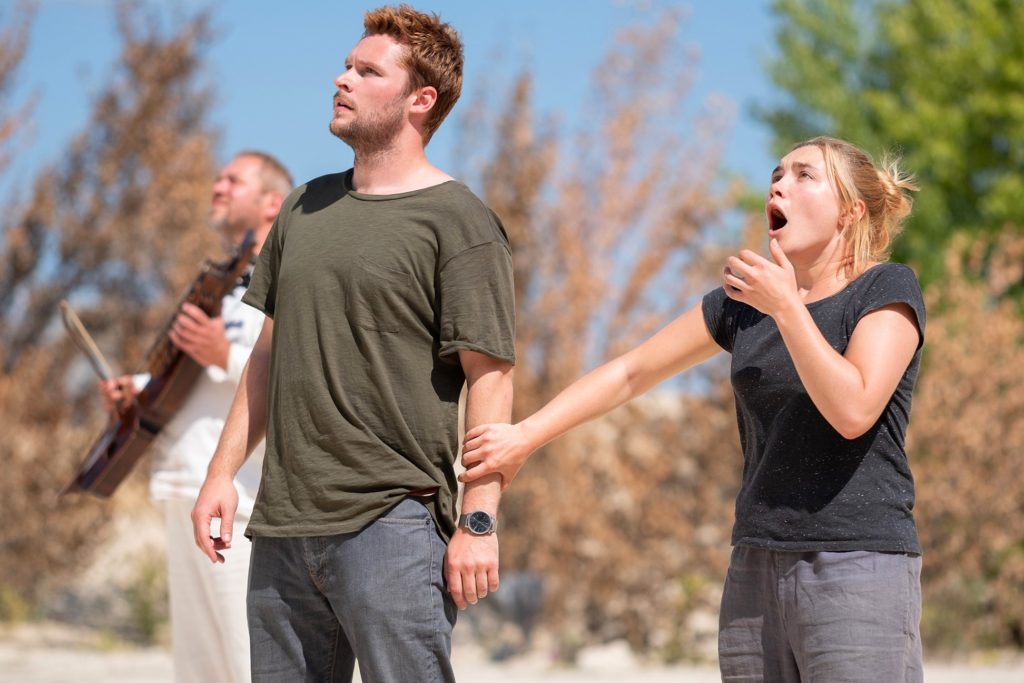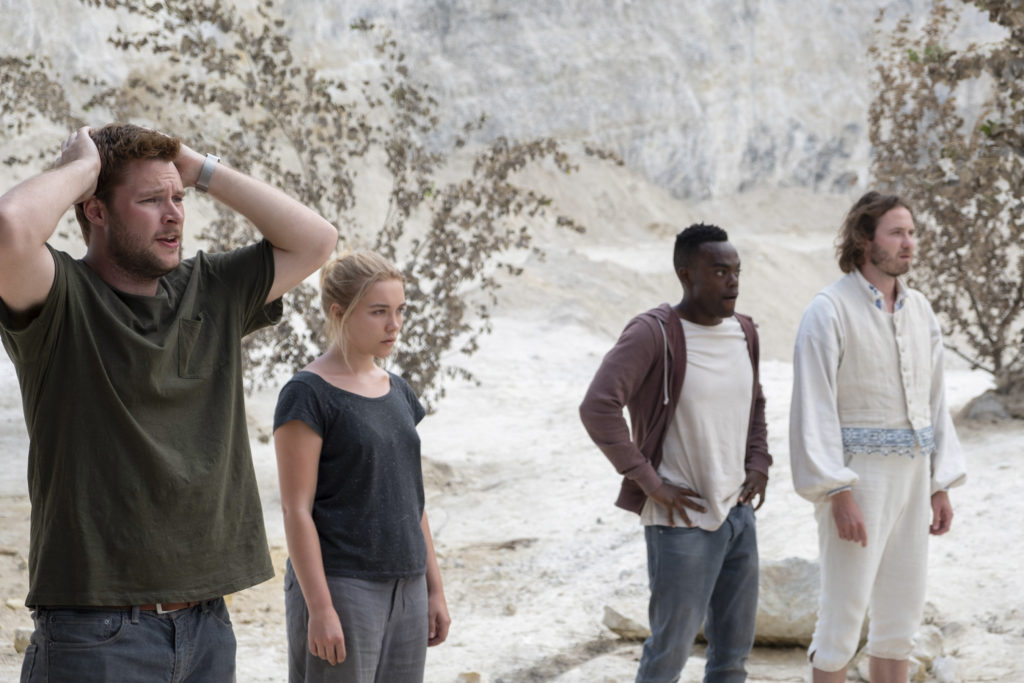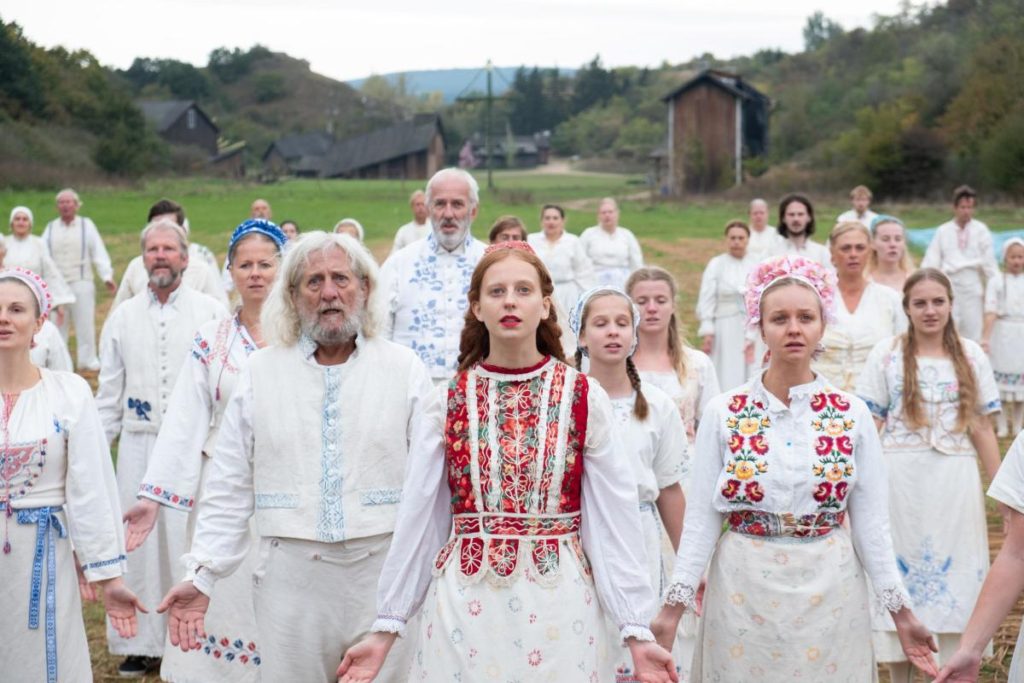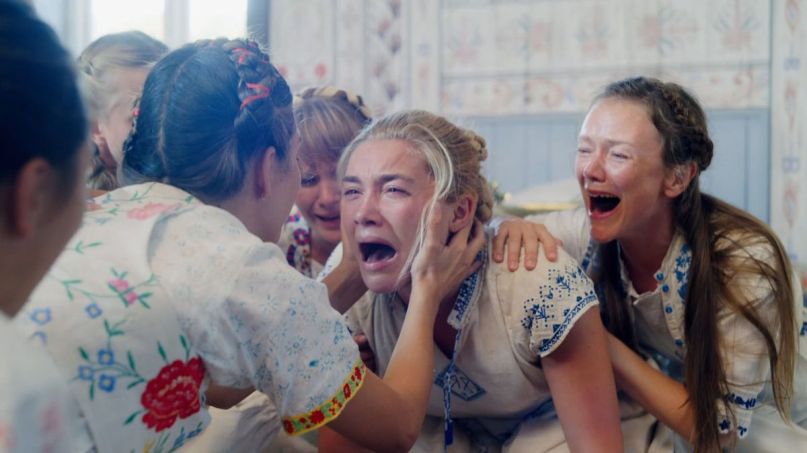
Toxic relationships have rarely faced as brutal a reckoning as the one visited upon the central couple in Midsommar, the breakup film to end all breakup films. Consistently ravishing, frequently mesmerizing, and occasionally exasperating, this horror whatsit from Ari Aster fixes on a festering union, the pus that oozes from its wounds slowly morphing into nightmare fuel. With Hereditary, Aster transformed a family’s hellish history into a gateway to literal Hell. Now with Midsommar, he’s turned his precise, pitiless eye to a doomed romance, exposing every crack in its fetid underpinning. Some directors might seize on the concept of attractive people taking a European idyll as the chance to tell a beautiful love story. This is a death story.
Still a beautiful one, though. Most of Midsommar takes place in Sweden (shooting was held in Hungary), in a bucolic paradise whose natural loveliness makes it the perfect camouflage for the inevitable suffering to come. It’s a land of warm, inviting colors: rippling green grass, snowy white gowns, a cheery yellow temple whose simple architecture seems to have been plucked from a book of fairy tales. There are slender trees with spangled leaves, and vast meadows full of swaying flowers. It’s heaven on earth, a rejuvenating escape from the persistent recognition that hell is other people.
Or maybe it’s romantic partners. When Midsommar opens, Dani (the characteristically terrific Florence Pugh) has been dating Christian (Jack Reynor, from Sing Street and Free Fire) for either three or four years, depending on whom you ask. That little bit of memorial asymmetry is just one indication that their relationship is less than harmonious. Another sign is the grimace that forms on Christian’s face whenever he sees Dani’s name pop up on his phone, a frown that turns into a groan as his friends urge him to rip off the Band-Aid and cut this buzzkill loose. But Christian fancies himself a good guy, and he’s wary of wounding the clingy Dani, whose neediness multiplies exponentially once her parents and sister commit simultaneous suicide.

Aster depicts that shocking event with sublime restraint, conveying its dreadfulness in just a handful of images and sounds: an ominous email, a dark bedroom, a smoke-filled garage, an ear-splitting scream. And beyond all else, Midsommar confirms what Hereditary already revealed: This dude knows how to make movies. As a writer, Aster remains vulnerable to some common pitfalls—most notably the temptation to go overboard in the final act—but his filmmaking technique is unimpeachable. Working again with cinematographer Pawel Pogorzelski, Aster’s camera is meticulous in its movements, while his framing is simply immaculate, resulting in countless images of exquisite composition: overhead views of pastoral tableaux, long shots of dozens of extras arrayed around a laden table, two-shots where the space between the characters speaks volumes. And sonically, he’s insistent but not assaultive; the doomy score, by Bobby Krlic (aka The Haxan Cloak) is deliciously menacing, while the whispering wind provides its own chilling soundtrack.
But Midsommar is more than just a collection of pretty pictures and spooky sounds. Instead, it finds Aster wielding his enormous talent to create a singular mood, one that mingles his sumptuous craft with a tale of cruel potency. The film teems with conflict and contradiction—it is modern and ancient, innocent and devious, enchanting and appalling—but it is also seamlessly cohesive. You don’t so much watch this movie as feel it seep into your bones.
What you don’t do, oddly enough, is quake with terror; as bloody and outré as Midsommar eventually becomes, it’s never especially scary. This is by design. Hereditary remains one of the most terrifying movies of this century, a relentlessly creepy fright-fest where every dark corner and dimly lit corridor loomed with the threat of unknown horrors. Midsommar is considerably brighter, literally if not tonally; in fact, its most disturbing scenes tend to take place in blinding sunlight. But while Aster’s follow-up to Hereditary may not deliver as many pulse-pounding moments, it’s on the whole a richer and more enveloping experience. Rather than constantly covering your eyes and holding your breath, you’re leaning forward with anticipation, savoring the strangeness and the mystery.

Not that Aster is any hurry to reveal things. Running a healthy 145 minutes, Midsommar substantiates Aster’s gift for building tension, the way he supplements his rigorous formal discipline with unyielding patience. Aforementioned suicide aside, nothing particularly terrible happens during the movie’s first hour, with Aster instead using the time to illuminate the rickety foundation of Dani and Christian’s relationship. They’re well-matched intellectually—she’s in college studying psychology, he’s in grad school for anthropology—and they get along well enough, except that he always seems to forget to tell her things, and she always feels like she’s imposing. So when Christian’s friends—a pompous triumvirate composed of bookish Josh (William Jackson Harper), caddish Mark (Will Poulter), and laidback Pelle (Vilhelm Blomgren)—encourage him to join them on a trip to Pelle’s Swedish hometown for a festival that takes place every 90 years, the invitation slips his mind until it slips out at a party. Dani is understandably stung by Christian’s secrecy, so he responds as any decent boyfriend would: He insists that she come along, and he lies that his buddies have enthusiastically endorsed her presence.
This behavior is cowardly, pathetic, and kind of funny. For all its violence and depravity, Midsommar also features a comic dimension, a light-hearted incredulity that helps counterbalance its gonzo happenings. Christian and his pals are essentially cerebral variations on the frat bro archetype—the collective non-reaction from Christian’s friends when he hurriedly informs them that Dani will be tagging along is a priceless display of stunned silence—and once they arrive at Pelle’s rustic village, Aster revels in throwing their pretentious buffoonery into sharp relief. He also playfully satirizes the trope of the ugly American who fails to appreciate other cultures, best personified here by Mark, a shameless skirt-chaser who inadvertently befouls a sacred landmark. Other bizarre sights and incidents—a caged bear, a spat over a thesis, a curiously misplaced pubic hair—only heighten the absurdity, spiking the film’s cocktail of foreboding malevolence with splashes of offbeat humor.
Dani, of course, finds none of this amusing. And on one level, Midsommar’s lovely, eerie setting functions as a romantic pressure cooker, unearthing the fault lines running beneath her and Christian’s partnership. Is Christian making eyes at that redhead across the field? Is he more interested in researching the commune’s pastimes than in securing her well-being? The longer they stay in this peculiar place, the more apparent their problems become. In a sense, all of the insanity that they witness and are subjected to—the ritual sacrifices, the forced hallucinations, the ceremonial intercourse—is just a new form of couples therapy.

Well, maybe not just. In terms of pure entertainment, Aster’s deliberate approach pays tremendous dividends, as Midsommar’s second half serves up a bevy of stunning sequences. There’s a giddy dance competition that augurs horribly for the winner but that unfolds with an intoxicating mixture of suspense, splendor, and joy. There’s a sex scene that’s both weirdly intimate and unnervingly remote, and that climaxes with a hilarious, unholy punch line. And the film’s pièce de résistance is a ghastly sacrament that leaves the sun-kissed grass spattered with blood and bone. Aster is in many ways a maximalist, but he also makes certain not to go overboard with gore, which makes the isolated glimpses of viscera all the more stomach-churning.
At the same time, his heedlessness can still get the better of him. Midsommar is engrossing throughout, but in its final stretch, when the blood starts flowing and the fires start burning and the people start screaming, its once-constant intensity diminishes. This is a challenge for many horror directors—the difficulty of alchemizing tension into catharsis without sacrificing momentum or immersion—and it’s one that Aster has yet to conquer. Two pictures in, two things are clear: Aster is a great director, and he’s still in search of his first great movie.
But this one is still awfully good. And what ultimately rescues Midsommar—or rather, what elevates it from expertly choreographed horror into something more meaningful—is Pugh’s performance. The actor isn’t yet a household name, but following her recent run—perfectly crisp in Lady Macbeth, heartbreakingly vulnerable in The Little Drummer Girl, marvelously steely in Fighting with My Family—she will be soon. Dani is a devilishly tricky role, a combustible mix of emotional sensitivity and raw nerves, but Pugh nails it, delivering a wild, fearless performance full of anger, terror, and grief. Midsommar is such a remarkably stylized film, it could verge on arch; Pugh gives it a powerful human center.
Aster, though, remains its chief architect, the ringleader of a gloriously deranged circus. There’s been a dubious strain of criticism the last few years addressing the recent boom in so-called “elevated horror”, arguing that certain whip-smart films (Get Out, A Quiet Place) have somehow transcended the genre. That’s nonsense, of course; every era has featured great horror movies that have stood as exemplars of the form without needing to push beyond it. Nevertheless, maybe it’s fitting that the residents of the commune in Midsommar believe in reincarnation, in death feeding life. Maybe horror cinema had to die so that Ari Aster could be born.
Grade: B+
Jeremy Beck is the editor-in-chief of MovieManifesto. He watches more movies and television than he probably should.
